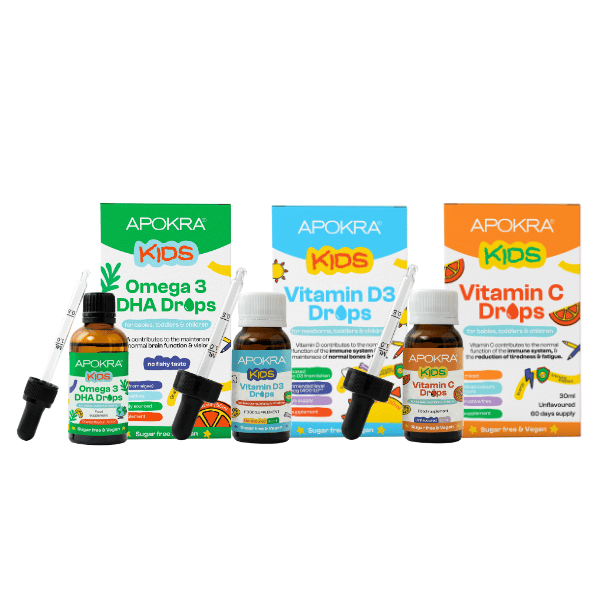How does Omega-3 affect your brain health and cognitive function?

Omega-3 Benefits for Brain Health and Cognitive Function
Omega-3 fatty acids, also known as polyunsaturated fats, are essential nutrients that play a crucial role in maintaining brain health and cognitive function. Heathy fats, like omega-3 fatty acids, are dietary essentials. The body cannot produce these types of fats on its own and must obtain them from dietary or supplemental sources.The Omega-3 benefits are countless, including their positive effects on brain health and cognitive function have been well-documented in scientific research.
What are Omega-3 Fatty Acids?
Omega-3 fatty acids are a type of polyunsaturated fat that are critical for brain health and overall general health. The three main types of omega-3s are alpha-linolenic acid (ALA), eicosapentaenoic acid (EPA), and docosahexaenoic acid (DHA). ALA is found in plant-based sources such as flaxseeds, chia seeds, and walnuts, while EPA and DHA are primarily found in fatty fish like salmon, mackerel, and tuna. The exception to the rule is algal oil, which is a plant-based source that provides both DHA and EPA.
How Does Omega-3 Affect Your Brain?
Omega-3s play a substantial role in supporting brain health and cognitive function. The brain is made up of approximately 60% fat, and omega-3s make up part of the structure of cell membranes in the brain. Further to this, they help to maintain the integrity of cell membranes, which is essential for communication between brain cells. Omega-3s also have anti-inflammatory properties and can help reduce inflammation in the brain, which has been linked to various disorders of the brain, including Alzheimer's disease and dementia.
Top Omega-3 Benefits for the Brain
- Can Improve Memory: Omega-3s have been shown to support memory and cognitive function. DHA is of particular importance and is found in high concentrations in the brain. On top of this, it has been linked with improved memory performance. A systematic review and meta-analysis of randomized controlled trials found that DHA supplementation improved episodic memory in adults aged 50 years or older (1). Another study published found that low blood levels of omega-3s were associated with decreased cognitive function, including memory, in middle aged women (2).
- Benefits Cognitive Function of the Brain: Omega-3s are important for a wide range of cognitive functions including memory. They also play a role in attention, problem-solving, and decision-making. A study published showed that higher omega-3 intake was associated with better executive function in older adults (3). Another study published found that omega-3 supplementation improved cognitive performance in children with attention deficit hyperactivity disorder (ADHD) (4). Omega-3s may also help improve learning ability, which is crucial for cognitive development in children and adolescents.
- Depression and Mental Health: Omega-3s have been shown to have a positive effect on mental health, particularly in relation to depression. Several studies have found that higher intake of omega-3s is associated with a reduced risk of depression and improved mood. A meta-analysis of randomized controlled trials found that omega-3 supplementation significantly reduced depressive symptoms in adults with clinical depression (5). Omega-3s are thought to play a role in the production of neurotransmitters, which are chemicals that transmit signals in the brain. They may help to regulate mood and emotions, and their anti-inflammatory properties may also help reduce inflammation in the brain, which has been linked to depression and other mental health conditions.
Best sources of omega-3
Foods rich in omega-3 fatty acids that primarily provide the highest levels are found in fatty fish, such as salmon, mackerel, tuna, sardines, and trout. These fish are rich in EPA and DHA, which are the two most potent types of omega-3s, and consuming them on a weekly basis can help boost brain health and cognitive function. The NHS recommends eating at least two portions of fish a week to meet the omega-3 requirements of the body (nhs.co.uk). For vegans and vegetarians, there are several plant-based sources including:
- Algal oil: high in DHA and EPA algal is considered comparable to fish-based omega-3 in terms of its health benefits. Algal oil can be obtained in supplement form.
- Flaxseeds: Flaxseeds are one of the best plant-based sources of omega-3s, specifically ALA. They can be easily incorporated into your diet by adding them to smoothies, yogurt, or as a topping for salads or used in baking.
- Chia seeds: Chia seeds are another great source of ALA, and they can be used in similar ways as flaxseeds. They can be added to a variety of foods, such as puddings, overnight oats, or as a topping for yogurt or cereal.
- Walnuts: Walnuts are a type of nut that is rich in ALA and provides a convenient and delicious way to include omega-3s in your diet. They can be eaten on their own as a snack, added to salads or baked goods, or used as a nut butter spread.
- Soybeans and tofu: Soybeans and tofu are plant-based sources of omega-3s, particularly ALA. Incorporating soy-based products into your diet, such as edamame, tofu, or tempeh, can provide a good source of omega-3s for those following a vegetarian or vegan diet.
An important point to consider is that while plant-based sources of omega-3s can be beneficial, they provide ALA, which needs to be converted by the body into EPA and DHA to be fully utilised. The downside is that the conversion rate of ALA to EPA and DHA is limited, and the efficiency can vary among individuals. Therefore, it's recommended to include both plant-based and marine-based sources of omega-3s in your diet for optimal brain health benefits.
In conclusion, omega-3 fatty acids play a crucial role in brain health and cognitive function. They are essential nutrients that cannot be produced by the body and must be obtained through diet or supplements. Omega-3s, particularly EPA and DHA, are important for maintaining the integrity of cell membranes in the brain, reducing inflammation, and supporting various cognitive processes such as memory, attention, and problem-solving. They have also been linked to improved mood and reduced risk of depression. Incorporating fatty fish, flaxseeds, chia seeds, walnuts, soybeans, and tofu into your diet can provide a good source of omega-3s to support brain health. If you're considering omega-3 supplements, it's always best to consult a healthcare professional to determine the appropriate dosage and type of omega-3 for your individual needs.
References:







Comments
Leave a comment
Your Email Address Will Not Be Published. Required Fields Are Marked *